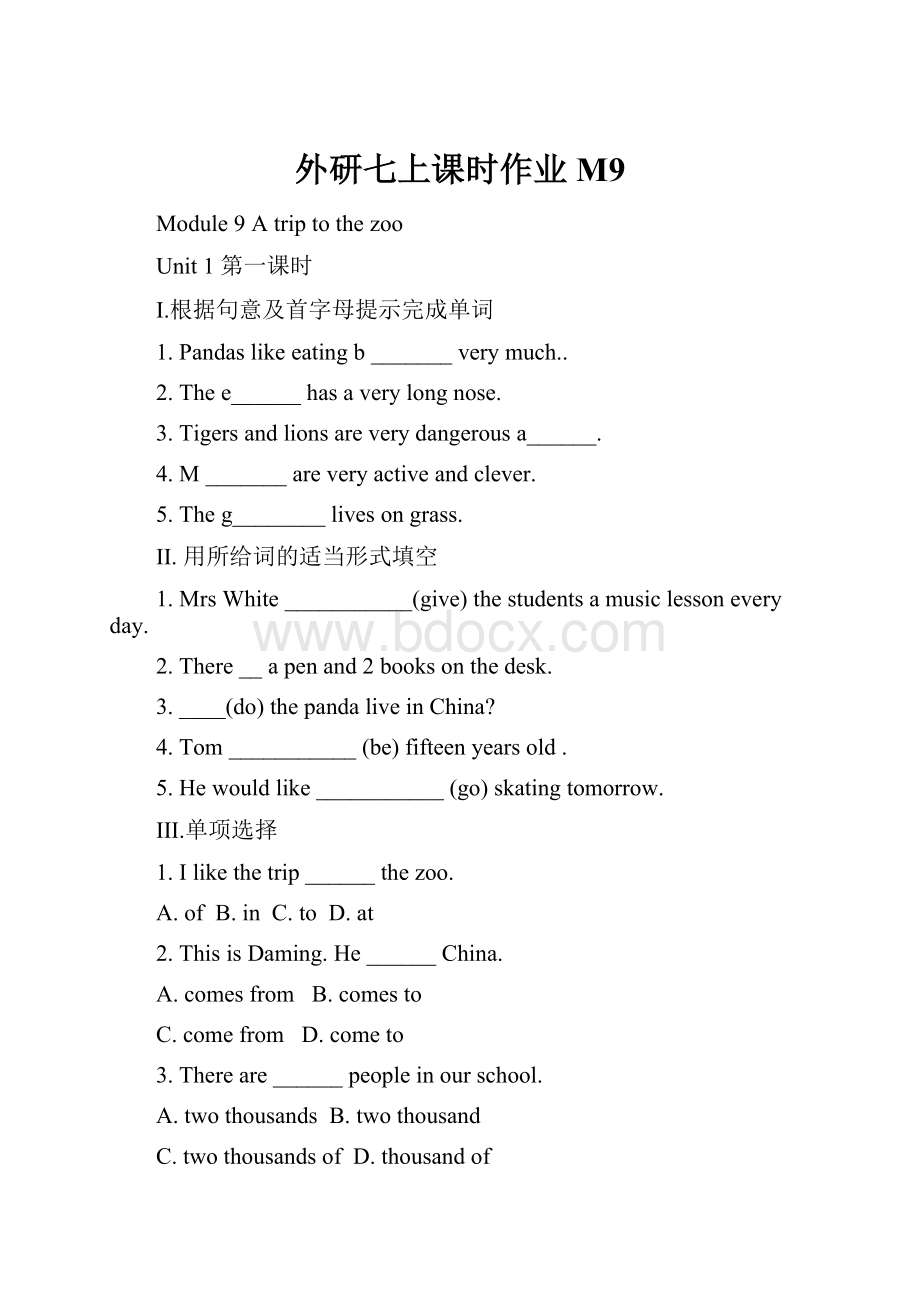外研七上课时作业M9.docx
《外研七上课时作业M9.docx》由会员分享,可在线阅读,更多相关《外研七上课时作业M9.docx(25页珍藏版)》请在冰豆网上搜索。

外研七上课时作业M9
Module9Atriptothezoo
Unit1第一课时
I.根据句意及首字母提示完成单词
1.Pandaslikeeatingb_______verymuch..
2.Thee______hasaverylongnose.
3.Tigersandlionsareverydangerousa______.
4.M_______areveryactiveandclever.
5.Theg________livesongrass.
II.用所给词的适当形式填空
1.MrsWhite___________(give)thestudentsamusiclessoneveryday.
2.There__apenand2booksonthedesk.
3.____(do)thepandaliveinChina?
4.Tom___________(be)fifteenyearsold.
5.Hewouldlike___________(go)skatingtomorrow.
III.单项选择
1.Ilikethetrip______thezoo.
A.ofB.inC.toD.at
2.ThisisDaming.He______China.
A.comesfromB.comesto
C.comefromD.cometo
3.Thereare______peopleinourschool.
A.twothousandsB.twothousand
C.twothousandsofD.thousandof
4.—Doyoulikeyour______Beijing?
—Yes,Ido.
A.visitB.visittoC.visitinD.visitat
5.—Wouldyoulike______thepanda?
—OK.
A.seeB.seeingC.seesD.tosee
IV.完成句子
1.音乐会上大约有三万人。
Thereareabout____________peopleattheconcert.
2.晚上我们在天空中能看到成千上万颗星星。
Wecansee____________starsintheskyatnight.
3.这些苹果很好,我还想要更多。
TheseapplesareveryniceandIwouldlike____________.
4再给我两把椅子。
Giveme__________________.
5.我常常去看我爷爷。
Ioften__________________
6.这是我第一次参观长城。
Thisismyfirst____________theGreatWall.
名师指津
1.visitv.参观;看望
其后可跟表示地点的名词,也可跟表示人的名词或代词。
如:
①I’dliketovisittheGreatWall.我想去参观长城。
②Iamgoingtovisitafriend.我准备去看一位朋友。
visit作名词,意为“参观;访问”。
如:
myfirstvisittoTokyo我首次访问东京
2.Sixteenthousandpeoplevisititeveryday.每天有一万六千人参观它(动物园)。
1)当hundred,thousand等词前面有数词或表示数字的形容词修饰时,它们本身不能加-s。
如:
fivehundredstudents五百名学。
2)在表示不确切的数目时,必须在这几个词的词尾加s,并与介词of连用,再接名词复数。
如:
hundredsofstudents几百名学生。
3.Thezoohasfivethousandanimals-kangaroos,polarbears,zebras,pandasandmanymore.你愿意跟我和贝蒂一起去看电影吗?
more常用来指额外的数量,意为“另外的,其他的。
”这样使用时,more前通常可以用some,any,much,many,afew,no,lots,alot或表示具体数量的词来加强词义,表示不同的程度。
如:
①Wouldyoulikesomemorebeer?
你要不要再喝点啤酒?
Module9Atriptothezoo
Unit1第二课时
I.根据句意及首字母提示完成单词
1.Mysisterisag______inthezoo.
2.W_______toBeijingZoo.
3.Thet______toHongKongisveryinteresting.
4.Howmany_______(camel)arethereinthezoo?
5.K________aretheanimalsthatrepresent(代表)Australia.
II.用方框内所给单词的适当形式填空
1.Thelion_______(not,eat)grass.Itlikes_______(eat)meat.
2.Let’s______(go)tothezooandseeanimals.
3.Ourschool_______(have)morethanfivehundredstudents.Allofus_______(work)hardatEnglish.
4.Thezoohasmany______(wolf),polarbearsandzebras.
5.Daminglikesto___________(visit)BeijingZoo.Heoften________(visit)animalsthere.
III.单项选择
1.Look,______.Let’saskhimsomequestions.
A.thereheisB.thereisheC.hethereisD.istherehe
2.—DoyouknowMr.Green?
—Yes.HeisfromAmerica______heismyEnglishteacher.
A.orB.butC.soD.and
3.____you____snakes?
A.Does…likesB.Does…like
C.Do…likeD.Do…likes
4.Manypeople________BeijingZooeveryday.
A.goB.seeC.visitD.come
5.Weoftengotothezoo________theanimals.
A.A.seeB.seeingC.toseeD.aresee
IV.句型转换
1.Theelephantlikeswater.(改为否定句)
Theelephant____________water.
2.Thepandaeatsbamboo.(改为一般疑问句,并作肯定回答)
______thepanda______bamboo?
Yes,____________.
3.ThekangaroocomesfromAustralia.(改为同义句)
Thekangaroo____________Australia.
4.Thezoohasfivethousandanimals.(改为同义句)
____________fivethousandanimalsinthezoo.
5.IliveinChinaandIspeakChinese.(改为用she作主语)
She______inChinaandshe______Chinese.
名师指津
1.Let’sgoandseeatiger.我们去看看老虎吧。
go(或come)and+另一动词是英语中常见的习惯表达法,and用来连接两个并列的谓语动词。
这两个谓语动词尽管是并列关系,但实际上后一动词是前一动词的目的,相当于go(或come)todo,而在实际使用时大多用and连接两个动词,很少在go(或come)后使用不定式。
后一种用法往往给人以不自然或死板的感觉。
如:
①Pleasecomeandmeetmyfamily.请来见见我的家人。
②Let’sgoandgiveherahand.我们去帮她一把吧。
2.Look,theresheis.看,她在那儿。
1)以here或there开头的句子,如主语是名词时,则应主谓倒装。
谓语如果是行为动词,还具有正在进行的意思。
如:
①Hereareyourkeys.你的钥匙在这儿。
②Therecomesthebus.汽车来了。
2)以here或there开头的句子,主语如果是代词,则不要倒装。
如:
①Hereyouare.给你。
②Hereitis.东西在这儿呢。
Module9Atriptothezoo
Unit2第一课时
I.根据句意及首字母提示完成单词
1.Thereisabigd_________inXinjiang,China.
2.WouldyouliketogotoI_________thiswinter?
3.Doesthelionliveinthej_________?
4.GuangzhouisChina’ssecondcitytohost(主办)theA_________(亚洲的)Games.
5.Cowseatg_________butgivemilk.
II.用方框内所给单词的适当形式填空
1.Thelittlemonkeyfrom______(American)isveryclever.
2.MypenfriendisfromEurope.She’s_________(Europe).
3.Thereareno______(leaf)onthetreesinwinter.
4.WeareChineseandwearein____(Asian).
5.—Isthecamel______(Africa)?
—Yes,itis.
III.单项选择
1.Thereis______Europeanwolfand______Asianelephant.
A.an;anB.a;anC.a;aD.an;a
2.Thecamelcomes______Africaanditlives______thedesert.
A.from;inB.in;in
C.in;fromD.from;from
3.______thesnakefromtheArctic?
A.DoB.DoesC.AreD.Is
4.______theelephantlikewater?
A.IsB.AreC.DoesD.Do
5.There______lotsofgrassonthegrassland.
A.isB.areC.haveD.has
IV.完成句子
1.有来自非洲和亚洲的骆驼。
Therearecamels____________and______.
2.袋鼠不吃肉。
Thekangaroo____________meat.
3.——大象是亚洲的吗?
——是的。
—______theelephant______?
—Yes,____________.
4.——狼吃水果吗?
——不吃。
—______thewolf______fruit?
—No,____________.
5.桌子上那本书是玲玲的。
______________________________isLingling’s.
名师指津
Thekangaroolivesinthegrassland.Iteatsgrassandleaves.袋鼠生活在草原。
它吃草和树叶。
1)grass是不可数名词,意
为“草”。
2)leaf作名词,意为“树叶,叶子”如:
Thereisnoleafonthetree.树上没有一片叶子。
leaf的复数形式为leaves,动词leave的第三人称单数形式也是leaves,二者易混淆。
如:
Heleavestheforestwithaboxofleaves.他带着一盒树叶离开森林。
3)定冠词the用在可数名词单复数或不可数名词前,用来表示某个或某些特定的人或事物。
2.TherearecamelsfromAfricaandAsia.ThisisanAfricancamel.那有来自非洲和亚洲的骆驼。
这是一只非洲骆驼。
句中的Africa表示的是国籍,意思是“非洲”,是名词;African意思是“非洲的”,可以是形容词,也可以是名词。
如果是名词,则表示“非洲人”。
我们曾学过类似的单词,如:
America-American
China-Chinese
England-English
Japan-Japanese
Australia-Australian
Asia-Asian
Africa-African
Europe-European
India-Indian
Module9Atriptothezoo
Unit2第二课时
I.根据句意及首字母提示完成单词
1. GermanyisaE______country.
2.Howmanya______arethereinthezoo?
3.Inthezoo,youcanseetheanimalsallaroundthew______.
4.Thetigerlikeslivinginthef______
5.ThekangaroocomesfromA______
II.用所给词的适当形式填空
1.Thereis________(a)elephantinBeijingZoo.
2.Itisa________(Europe)wolf.
3.________thewolf_________(come)fromAmerica?
4.It________(noteat)vegetables,butit_________(eat)meat.
5._________(be)thebirdsfromSouthAmerica?
III.单项选择
1.Therearetwo_______andsix_______inthezoo.
A.kangaroos;wolfsB.kangaroos;wolves
C.kangarooes;wolvesD.kangarooes;wolfs
2.Thisis_______Africancamel.Thatis_______Europeanwolf.
A.a;aB.an;anC.a;anD.an;a
3.Thekangaroois_______Australia.Itlives________grassland.
A.from;inB.comefrom;inC.comesfrom;inD.from;on
4.HeisanAustralianboy.Heisfrom_______.
A.JapanB.ChinaC.AustraliaD.England
5.Daming________pandasverymuch.
A.likeB.islikeC.likesD.doeslike
IV.完成句子
1.狼不吃树叶。
Thewolf__________________.
2.——猴子生活在丛林里吗?
——是的。
—______themonkey______inthejungle?
—Yes,it______.
3.骆驼生活在沙漠中。
Thecamel________________________.
4.森林中有很多蛇。
Therearemany________________________.
5.有来自印度的大象。
Thereareelephants____________.
名师指津
1.Doesthecameleatfruit?
骆驼吃水果吗?
主语是第三人称单数的行为动词的一般现在时疑问式是在句首加助动词does,后面的谓语动词还原为动词原形.其肯定与否定回答用Yes,Xdoes./No,Xdoesn’t.
1.2.an&a
是用a还是用an,不取决于后面的单词是否以元音字母开头,而取决于这个单词的第一个因素是元音音素还是辅音音素。
如果是元音音素就要用an,如果是辅音音素就要用a。
如:
aEuropeanwolf,虽然European是以元音字母E开头的单词,但它的第一个因素/j/是辅音音素,所以,该词前面的冠词要用不定冠词a而不是an。
我们学过的另一个单词hour,属于虽以辅音字母开头,但其第一个因素是元音音素/au/,因此,词前的冠词要用an,即:
anhour。
2.Theanimalscomefromallaroundtheworld.这些动物来自全世界。
11)allaroundtheworld意思是“遍及全世界。
”
2)类似的用法还有:
allovertheworld;throughouttheworld。
如:
Wehavefriendsthroughouttheworld.我们的朋友遍天下。
Module9Atriptothezoo
Unit3
I.根据句意及首字母提示完成单词
1.Peopleeatfruitandvegetablestostayh_______.
2.Iwouldliketwok______ofmeat.
3.Thereareabout1,600pandasinthew______inChina.
4.Wewillhaveat__________tothezoo.
5.T______ofpeoplevisitShanghaiWorldExpoeveryday.
II.从方框中选择适当的词并用其适当形式填空
live,world,America,climb,stay
1.Hisfriendisan______boy.
2.______treesisthepanda’sfavouriteactivity.
3.Thewindow______openintheday.
4.Theanimalscomefromallaroundthe______.
5.Thewolf______intheforest.
III.单项选择
1.Tigersusuallyneed______meataday.
A.6kilosB.6kiloC.6kilosofD.6kiloof
2.Camelslive_______thedesert.
A.onB.inC.atD.of
3.Takethemedicinethreetimes_____day.
A.theB.anC.aD.one
4.Mygrandparentsstay________becausetheyoften________sports.
A.health,doB.health,does
C.healthy,doD.healthy,does
5.yoursonfruit?
A.Is;likeB.Does;likes
C.Do;likesD.Does;like
IV.句型转换
1.ThesnakecomesfromAsia.(改为一般疑问句并作肯定回答)
______thesnake______fromAsia?
Yes,____________.
2.ThetwomonkeysareSouthAmerican.(改为一般疑问句并作否定回答)
______thetwomonkeysSouthAmerican?
No,____________.
3.Myfavouriteanimalistheelephant.(对划线部分提问)
____________yourfavouriteanimal?
4.Thetigereats5kilosofmeataday.(对划线部分提问)
____________meatdoesthetigereataday?
名师指津
1.Theyusuallyeat15kilosofbambooaday.它们通常每天吃十五公斤的竹子。
1)kilo表示“公斤”,akiloof表示“一公斤的……”;2kilosof…“二公斤的……”,依此类推。
2)akiloof…或2kilosof…后面可接可数名词,也可以接不可数名词,如:
akiloofapples或